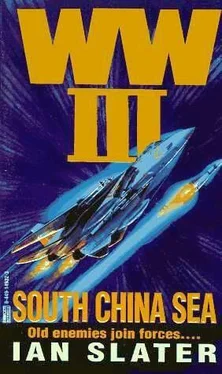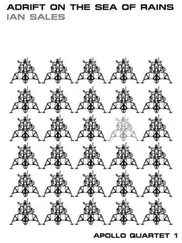The old man nodded. “We are the Jews of Vietnam. But all we want is to live here in peace and harmony.”
“You want me to tell someone in Washington that Vietnamese Chinese aren’t involved? That it’s Beijing behind the attack on the islands?”
“Yes. Beijing will deny it, of course.”
“Let me get this straight. You say Beijing is doing this— attacking the oil rigs.”
“Yes,” the old man said, “to give Beijing an excuse to seize all the islands in the South China Sea.”
“You think Beijing’s so corrupt,” Baker went on, “that it would use pirates to attack two of its own rigs, kill its own—” Baker stopped. It was a foolish question. These were the men who had run over hundreds of their own students. A few dozen oil-rig workers wouldn’t faze them. “But wouldn’t this put off American investors as well?” he asked.
“Not if Beijing and some American investors know the truth of it.”
“But that would mean an American company would have to go along with…”
The old man smiled. It wasn’t a smile of joy, but rather one of wry amusement at the American’s naïveté—to think a U.S. company would not secretly side with Beijing, and to think Beijing would be concerned about a few Chinese workers, was to be in a kind of kindergarten of politics. What were a few lives to Beijing if they could use the attacks to bring the world against Vietnam in Beijing’s push to claim all the islands as theirs?
All Baker could respond with was to say that Americans would never do such a thing — stage an incident, kill their own to frighten away the competition, in this case, Vietnam.
“You Americans,” the old man said confidently. “You hold the individual so sacred. Here we are but grains of sand in the ocean.”
“But won’t the Vietnamese twig? I mean, won’t the Vietnamese suspect the raids were to blame them?”
“Of course,” the old man replied. “But for the Vietnamese to retaliate against China would be an act of war. It would be to risk international sanctions against Vietnam, and it has taken Hanoi over twenty years since the Vietnam War, since the American defeat, to build relations up with the U.S. again. It’s only a few years since the U.S. embargo on trade with Vietnam has been lifted.”
“Then China is free to keep hitting whatever claim they like?” Baker asked. “Be their own agents provocateurs? Frighten everyone off the islands, then say they’ll have to garrison them with troops for self-protection?”
“Yes.”
Baker shook his head worriedly. “But without proof, I can’t go anywhere with this. We’d have to have proof that—”
The old man was astonished. “But you are an American officer,” he said, as if that explained everything. “If you tell your government what I have told you, surely—”
“They won’t believe it. Or rather, they might believe it but they won’t do anything unless there’s proof positive.”
“But you are an officer. A—”
“I am a grain of sand,” Baker said. “Besides, why should I believe you — with respect. This could be a Vietnamese ploy to attack their own islands in the Paracels to make it look as if the Chinese—”
“But I have told you the truth,” the old man said, his head rising in indignation.
“And where did you get it?” Baker asked.
“From people of my blood — who were offered gold to sail with the pirate junks.”
Baker could see he’d deeply offended the old man. “I’m sorry but — I mean, I’d need proof. Otherwise it’s just another story in a sea of stories that one hears—”
“Dalat!” the old man said. “Near Dalat.” Dalat was a temperate city in the central highlands, and during the Vietnam War there had been an unwritten mutual agreement that it was a no-fire zone. Both sides had used it for R&R in one of the stranger aspects of that long-ago conflict. The weather in Dalat was always good. At the coldest, it would rarely fall below 60 degrees Fahrenheit, and at its hottest, wouldn’t rise to much more than 73 degrees. A place of gardens, of tranquility, it would be pleasant to visit if for no other reason.
“What about Dalat?” Baker pressed.
“To show you I am a man of the truth.”
Baker, nonplussed, waited impatiently. It had become cooler, a waist-high mist covering the canal, creeping toward the congestion of sampans and other river craft.
“In Dalat there is an MIA.”
Baker felt his heart thumping. “Where in Dalat?”
“I will tell you if you will tell your government what I have told you.”
“Yes,” Baker said, “I’ll send in a report.”
“The MIA is in a village near Lang Bian Mountain,” the old man said. “North of Dalat The people of Lat village will help if you give them this.” He took a small scrimshawed shark’s tooth pendant from around his neck. “When will you leave?”
Baker gave the old man twenty dollars, to be shared with the go-between. “In the morning.”
Afterward, Baker sent a message to the Pentagon about what the old man had told him concerning the attacks on the oil rigs, but he cautioned that it was only one old man’s story amid so many.
* * *
When morning came, Baker did nothing about the MIA— there was nothing he could do until he got special permission from the Vietnamese. Lam Dong province, in which Dalat was situated in the central highlands over 225 kilometers north of Ho Chi Minh City, had been closed again to United States citizens, who were still being charged by the Vietnamese with covertly supporting the FULRO — Front Unifié de Lutte des Races Opprimés — United Front for the Struggle of the Oppressed Races — guerrillas in the highlands. The CIA had long denied any continuation of funneling arms, but now and then FULRO rebels would stage another ambush or shoot up one of the supposedly secret Vietnamese reeducation camps, which, rumor had it, were still run for some U.S. POWs and MIAs.
In the evening, Baker went down to the canal to talk again to the old man, to get more details, but he was gone. Baker found him near midnight in a sampan that was bumping among the bridge pilings, his throat cut. He guessed the old man had been killed for what he’d known either about Dalat or about the pirates’ attacks in the Paracels and Spratlys.
What Baker hadn’t banked on was the Vietnamese response to the very first attack in the Spratlys, but then again, the Vietnamese had had dealings for a thousand years with the Chinese, and they decided to react immediately rather than let their traditional enemy think he’d gotten a toehold in Vietnamese waters. Hanoi headquarters ordered the Haiphong base to attack, and within the hour, with an efficiency that, after the Vietnam War — or what the Vietnamese had called the Second Indochina War — was among the best response times of any Asian coastal navy, two Soviet-made Osa-class missile craft armed with four surface-to-surface N-2 missiles raced out into the Gulf of Tonkin, ready to attack anything Chinese.
The flag behind each of the missile boats, that of Vietnam, fluttered furiously as the Osas’ bows lifted and the brown water boiled in urgency, the Vietnam missile boats picking up speed, heading southeast to the Chinese-occupied islands in the Paracels. The boats’ crews, however, were under no illusion, for they knew that they were heading toward the People’s Liberation Army’s new navy, which Beijing had boasted was nothing less than “a great wall of iron.”
Ten miles from the nearest Chinese-claimed island in the Paracels, one of the Vietnamese boats’ radar picked up two blips advancing from the east at thirty knots plus: two Chinese Huch’uan-class fast-attack hydrofoil boats. A Vietnamese Osa fired its starboard forward SS-N-2 missile, the Chinese hydrofoil immediately going into a defensive “weave” pattern.
Читать дальше












